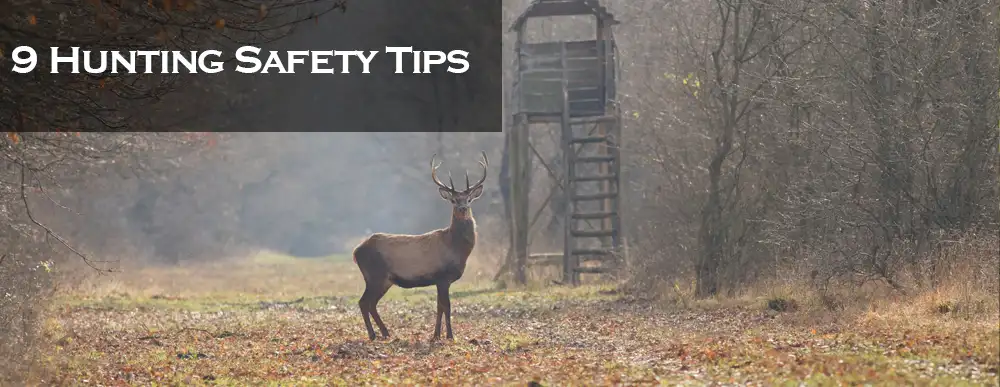
Hunting Safety – 9 Expert Tips Making Every Hunting Season Safe ::
Hunting is one of the safest sports you can be a part of when following hunting safety tips. Why is that? Hunters have a healthy respect for hunting safety rules and regulations. Know how to keep hunting trips safe for yourself and your surroundings. This fall, be safe when you enter the woods.
-
Hunting Safety Tip #1: Know what you’re shooting
What you saw moving could have been your fellow hunting buddies. It could be a hiker or other outdoor enthusiast. With that in mind, be careful and know what you are shooting at! Do not pull the trigger if you are not 100% sure that you know what you are shooting at.
-
Hunting Safety Tip #2: Wear the appropriate safety gear
Not all states require hunters wear hunter orange. With that said, over 80% of big game hunters and 66% of small game hunters wear hunter orange.
SAFETY FACT: Hunters wearing orange are seven times less likely to get shot.
When people see hunter orange, they know what it means. Animals like deer will not notice the bright color. Why? Because they are less sensitive to the longer wavelengths put out by oranges and reds.
-
Hunting Safety Tip #3: Wear fall prevention devices while in trees or ladders
Many hunters, like bow hunters, use tree-high hunting blinds. Be wise in choosing your position! Make sure to wear climbing safety gear.
Tribune-Star states an eye-popping stat. In the last five years, 55% of reported hunting accidents were from falls from a tree or ladder stand.
Most of those who fell were not wearing any form of fall-prevention device. This could have prevented serious injury. We recommend wearing a full-body harness. The harness gets attached to the tree or ladder as soon as you begin to climb.
-
Hunting Safety Tip #3: Watch Exertion Levels
Be aware of how you feel. Drink plenty of liquids. Pay attention to exposure to heat and cold. Heart attacks are surprisingly common while hunting. The exhilaration of the hunt can send heart rates soaring. Pay attention to your body’s warning signals:
- Uncomfortable pressure like a fullness, squeezing sensation, or pair.
- Chest pains spreading to your shoulders, neck, or arms.
- Shortness of breath, nausea, or dizziness.
-
Hunting Safety Tip #4: Stay hydrated and nourished
Passing out from hunger or dehydration kind of takes the fun out of the trip. If nothing else, drink plenty of liquids (that are not alcoholic).
-
Hunting Safety Tip #5: Dress for the weather
It often gets nippy outside about the time hunting season rolls around. Come back with all your fingers and toes in working order. Bundle up for the cold and lighten up for warmer days.
-
Hunting Safety Tip #6: Keep your safety on while you walk
This one is self-explanatory. While you walk, keep your safety on to prevent inadvertently firing. Always treat your gun as if it can fire at any time. Even the best firearms can fail because they rely on a mechanical device. Try out different field carriers that teach how to accurately control your muzzle. Keep your fingers away from the trigger. Keep your safety on until you’re ready to fire.
-
Hunting Safety Tip #7: Keep your barrel clean
Don’t let your gun barrel get clogged with mud, snow, or excess lubricant. Even a little blockage causes increased pressure. Increased pressure may cause guns to bulge or even burst on firing because the bullet or shot cannot exit the barrel.
-
Hunting Safety Tip #8: Understand your coordinates
Take a fully charged phone and/or GPS with you. Test the GPS app before you head out. When lost or disoriented, these can be life savers. Many GPS devices come with built-in hunting waypoints, maps, and information. These keep you in the loop while you move.
-
Hunting Safety Tip #9: Stay sober
Discharging a firearm while under the influence is illegal. Statutes vary as to the acceptable limits. In any case, carrying a firearm after drinking is dangerous to you and those around you. It is not recommended.
Stay safe and warm during this hunting season! And may the hunt be with you!
Article by The Foremost Creative Team

